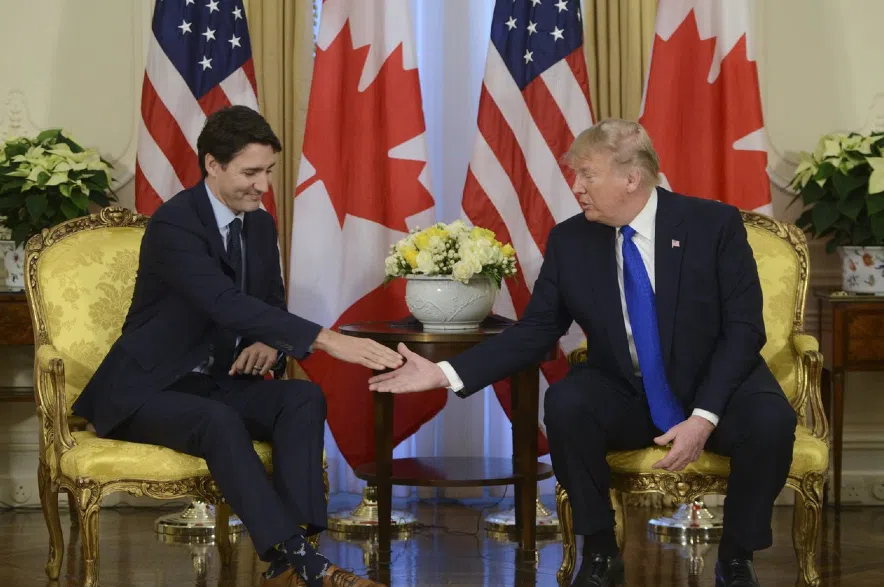Donald Trump will be back in the White House on Jan. 20, and following the United States election, Trump has threatened to impose a 25 per cent tariff for Canada and Mexico.
On The Evan Bray Show Thursday, David Wilkins, American attorney and a former United States ambassador, discussed what this means for Canada and shared his advice.
Listen to the full interview here:
The following transcript has been edited for length and clarity.
Evan Bray: You were in the chair for the better part of four years. Can you speak to the historical relationship as you see it, between the United States and Canada?
David Wilkins: Being US ambassador to your wonderful country was a privilege of a lifetime. I loved your province of Saskatchewan, been there many, many times we’ve got the greatest relationship in the world, certainly the greatest trade relationship the world has ever known.
I think sometimes we’re so big, we’re each other’s best partner with each other’s best customer. Sometimes we get too involved in what’s not working, and what we disagree on, rather than accentuating the positive and thinking about all the wonderful things going on.
Sometimes they take longer, as I was privileged to be ambassador, when President Bush and Prime Minister Harper worked out the softwood lumber agreement that been in dispute for many decades, when I arrived in Canada and Harper met Bush the first time, and first thing he said was, “Softwood lumber is my number one issue.” They got to work on it using the political capital, and three months later they solved it lasted nine years. So we always work through disagreements, and I think we’ll be able to work through any disagreements that come up in the next year.
There’s no doubt that incoming President Donald Trump and our current Prime Minister Justin Trudeau, philosophically are not on the same page. Is it going to take a Canadian election before we can settle things down again? Or do you think there’s the possibility with the two current leaders that we can make this work?
Wilkins: I would always hope, regardless of who the leader is, the relationship is so strong that it will work out historically. Have the republican and conservative administrations in the two countries work perhaps better than that when it’s a different party, and have the liberal and democrat administrations in both countries work better? Sure it has.
You’ve got Joe Biden and Prime Minister Trudeau for the last many years now, but I had that situation when I arrived in Canada. You had Prime Minister Paul Martin and George Bush, and then six months later you had Stephen Harper come in, and Bush and Harper had a very good, close working relationship, and that was a positive thing.
It doesn’t mean you can’t work well together even if there are different parties or different philosophies, and we have to make it work.
At least for the next few months, you’ve got Prime Minister Trudeau, and you’ve got, in about 18 days, President Trump — and I have every reason to believe they can work together and make it work.
Do you think Donald Trump is serious? Will he impose these tariffs, or was this basically an opportunity to achieve something prior to taking office?
Wilkins: I think Canada has every right in taking it very seriously. Donald Trump said he would impose a 25 per cent tariff on imports from Canada and Mexico, unless — and I think that’s the key word —unless the countries did more to stem the flow of migrants and illegal drugs at the border.
I think that Canada would support securing the border, your Prime Minister said that, your premiers have stepped up. Premier Scott Moe had a very strong statement in that regard, talking about the positives of the relationship and what they could do to improve the border.
Canada needs to concentrate on that. How do you how do you work with us to make the border secure? Surely, we all should want to do that.
How do you make the border more secure, to stem the flow of illegals and illegal drugs? Be a partner with the US in making that border the most secure it can possibly be, while at the same time keeping it trade friendly.
I know that the provincial leaders, such as Premier Moe and Prime Minister Trudeau and his cabinet have already announced a $1.3 billion Canadian dollar plan to fortify the border and make it more secure. Those are all positive steps.
What advice would you have for Canada, if you were brought in as a special consultant going forward, right now today, what advice would you have for our country?
Wilkins: I would say, stay calm. Advocate your position. Advocate the strength of Canada, what it brings to the relationship and the importance it is to the United States.
I think being a partner with the US is positive for both countries. I think that would accentuate how we can work together to make it better, and when we do that, we achieve great things.











